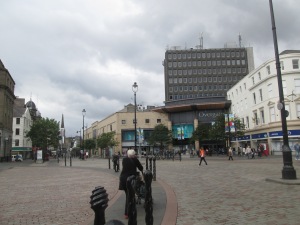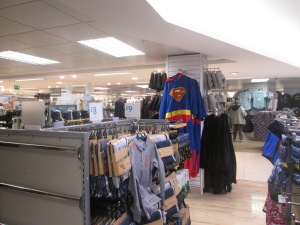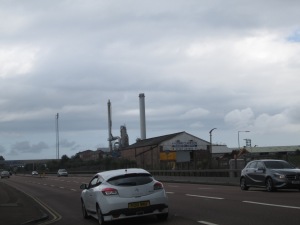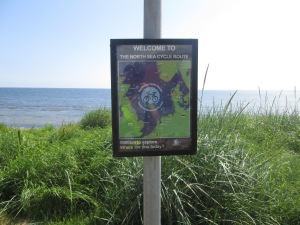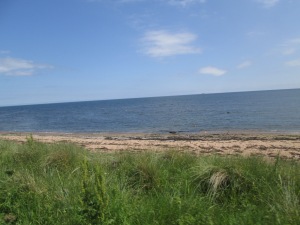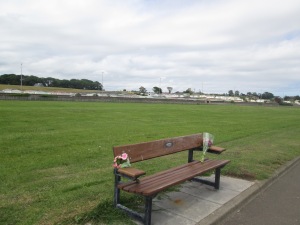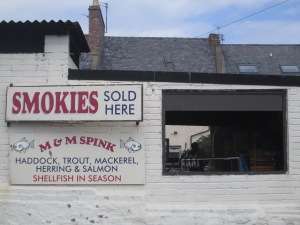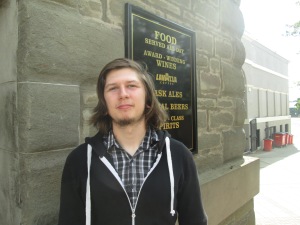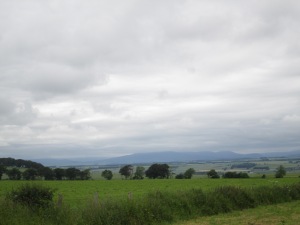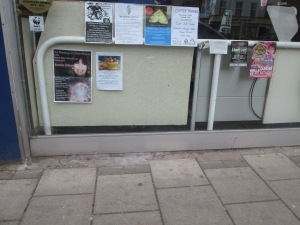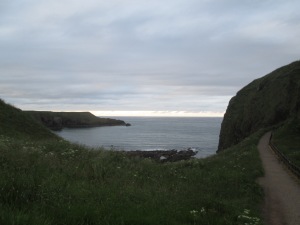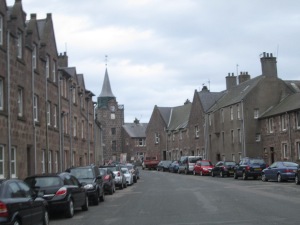‘No, but where are ye heading?’ – Richard, Montrose, asks me this repeatedly and keeps forgetting the answer, over many beers in the Royal Arch pub.
Now I knew Scotland would be quite special, but these landscapes are starting to take the biscuit. Aside from the jerry-built crassness of the occasional industrial satellite town and its barrack-like social housing, the terrains and built design are unremittingly beautiful and spell-binding. There are houses and public structures built to last, not built to pass, and by some magic spell the misguided callousness of 1960s town planning has largely been avoided.
Even Dundee, a town that people on the road have struggled to report much good about, comes along with many a pleasant surprise. The previous evening I swept over the wide River Tay, immortalised in the bloody awful poetry of William McGonagall. I’m alert to distant lights on the other side signalling a harbour and a bustling town dense with life. Time in the hostel threw me against the diverse stories of Dundee’s visitors and, after a pleasant enough sleep in a dorm full of student backpackers, I get up and wander about the town’s high street.
Philip leads the way, a young guy from the south of Spain who I get talking to in the hostel. He recounts his enthusiasm for St. Andrew’s, before leading me over to a city map to point out the town’s many sites and cycle routes beyond. I’m surrounded by many of the trappings of The British Town Centre: your Greggs, Tesco, Primark, Boots, the usual high street malarkey. But I’m also close to a gloriously pseudo-Roman Caird Hall, and statuettes of Desperate Dan and Minnie the Minx, characters from the kids’ comics Dandy and The Beano which stem from this city.
As Philip traces his finger across the map with a degree of wonder, I spot Mills Observatory, the only full-time public observatory on these isles, and recall the fine view of the stars these parts afford on a (rarely cloudless) night. There’s an arts centre, a science centre, galleries and universities in abundance, Dundee and Abertay. As I discover, the city also stakes a claim to discovering radar (the ghosts of Bletchley and Orford Ness remark whatever mate), as well as inventing Brian Cox, Lorraine Kelly, Grand Theft Auto, Snow Patrol, the absurdly stereotypically Scottish comic The Broons, the adhesive stamp and the first cash machine. So should we be thankful…?
Well, I wander about to make up my mind. In Primark I find a cheap waterproof coat for the rainy summer ahead, and in Boots I interrogate some unlucky assistant about midge repellents and ointments for sore arses. Saddle sores have come back with a menace. They used to whale around here and make ships at Robb Caledonia yard, but judging on the town centre, they now sell stuff we probably didn’t need. A superman onesie or fruity pair of undergarms for you? I notice a thicker and quicker accent in some workmen outside Greggs and realise that certain aspects of articulation reflect not merely a specific region, but the nature of it: cities and towns produce more variable and distinct accents, quicker but trickier to follow.
I buy a birthday card for my octogenarian grandma in one shop and start thinking of home. I love my family and my friends immensely. On a steep hill they give me a strength, but idling about in a town centre like this, the voice of Mephisto pops into my head and whispers words about boarding trains bound south. After finding the night’s dinner in Tesco, I get talking to James, a young guy selling the Big Issue. I ask him about sales, reflecting on what feels like a relative decline in the circulation of the homeless weekly. He tells me it’s usually tough around this time of month, a few days shy of pay-day, and he’s kept afloat by his regulars. But sales have fallen since the rise to £2.50. I wonder how sustainable the publication is in the long-run, but appreciate its ethos. But if homeless people can be helped by selling a publication that gives them 50% of its cover-price, what other forms of long-term skills training and other work might help even more?
I leave Dundee’s centre to the east, passing by its dilapidated-looking but perfectly busy harbour, and weaving out on a dull A-road to the north. Nothing I see imprints itself on my mind, except that at some point I have entered the county of Angus, and that some generous Hindu ascetic has left an icon of Ganesha atop a motorway bin, sat meditating wistfully on top of a puddle of rainwater, facing an endless stream of traffic.
I only awake from the fug of freight-truck fog at the lovely seaside town of Carnoustie, which I find by accident after getting lost from a typically esoterically-signed cycle path. Some of these routes are mapped out with the kind of care ordinarily reserved for a cult bloodletting orgy.
The town is quite a charming and well-to-do place, suitably set aside from the dirty harbour and nearby roads and carrying its own relaxed presence. I pass sturdy looking grey brick bungalows and family homes decked out with gorgeous flowers. Afternoon at the bowls club is as sedate and elated as a pint of John Smiths and a pack of diazepam, and after some friendly directions I detour into the little town centre, stumbling across a beautiful stretch of coastline and beaches. I have to carry the bike over a railway bridge but it’s worth it, taking me to a beach path that links this stretch of Scotland with some madcap cycle route across the North Sea-facing countries of Europe.
Cows graze by the sea, wistfully unaware of the fine steaks their fattened body masses will become. It looks like a good life, and I wonder whether life in cities can resemble a kind of human farm. Looked at from a distance, many lives seem trapped yet with just enough for survival: a welfare system that provides a little less than the bare minimum to live; jobs that are largely founded on uncertainty, insecurity and low pay; and leisure activities in most towns which pretty much involve buying media, booze, junk food or cheap clothes. Grazing in Tesco or McDonalds, in the wetherspoons pub or at home with a takeaway and cable TV, bred for consumption, bred to consume.
I’m just as much a heffer as the next person. Were it not for the rebellious impulses that drive people to take on new identities and values than their parents, to devote their lives to something non-economic, I wonder what we’d be.
Ian is riding a little ahead of me, and I catch him up and start conversation. He’s not clad in buttock-shrinkwrapped neon lycra, nor is he riding a millionaire’s steed, a rare sight for the occasional cyclist I pass. He tells me that the cycling is good in Scotland, with safe and clear paths. We’re on the road to Arbroath, and he points out the Abbey and the Harbour as curious sites.
Parting ways, and I reach a touristy seaside town with a working harbour. Lobster pots are piled high next to signs offering angling trips to the passing tourist. I ask one boat engineer about the fishing trade today. ‘It’s all shellfish, lobster and crab’. He’s busy and disappears into the town, and my nose pulls me towards the delightfully smoky airs of a series of seaside shacks.
They’re selling Arbroath smokies, a particular kind of smoked fish, usually haddock but varying depending on the catch. Fishing, as I found in the north-east of England, was often a family business, with men catching the fish and women smoking them. Women were also heavily involved in preparing lines and baits and theirs’ was also a full-time job. Being a strange and insular lot, frequently inter-marrying, odd omens have accrued round here, and to mention pigs, salt, rabbits or hares spells immediate death on the wild oceans…
A Lowlands and urbane English pronunciation has permeated in Arbroath, but I come across one old poem about women workers in the fishing trade which captures what an Arbroath accent might be like, in a poem by Marion Angus:
‘Speer at her o’ships and sailors.
Storms on the sauty brine
“It’s far eneuch awa”, says she,
“And ower lang syne.”‘
I drift through the town centre which is equally pleasant, fish and chips and other stores catering for passing visitors. Outside the town’s Wetherspoons I get talking to one local young man, Greg. Speaking with an unusual degree of warmth and sincerity, he tells me:
‘all I want to do is help others. If other people are happy, then that’s enough.’
I ask him about life in the town for young people, and get a more mixed picture of things. He’s from the town, but has been unemployed since college, and is 20 now. He trained as a sound engineer but there’s little work nearby, and instead he volunteers his time for occasional gigs and charity benefits. ‘Living on the streets of Arbroath isn’t as tough as sleeping in the fields of Africa’.
He’s determined to look up, despite the current uncertainty of his circumstances. He’s a strong yes supporter. ‘It’ll give Scotland the chance to do its own thing.’ He thinks that independence will bring the jobs the areas around here desperately need. I’m not sure, but in the warmth of his conversation I sense that he would be a superb youth worker, and I tell him so. I hope he’ll find his feet. There are good people in every place and every walk of life. Sometimes they too need some guide or inspiration. The charity jobs that have brought me great pleasure and rich life experiences were gained quite by chance and good luck.
I take a hilly road out of Arbroath, passing tunnels growing delicious-smelling strawberries. My legs are aching, and the road is dull and long. Moments of doubt continue to skitter all about me like a plague of mosquitoes. Can I even get to Montrose? Often it’s the dullest of roads that are toughest to tackle.
Montrose arrives quite from nowhere, like most Scottish towns, a pleasant bloom in a seaside valley after a long series of hills. I pass by the River Esk and a basis rich in birdlife, then cross a metal bridge into the small coastal town. To my right is a medium-sized, busy looking harbour, and the road threads into a town centre dominated by a grand, Victorian looking high street, with statues of a few old worthies looming overhead. My belly naturally gravitates towards a chip shop. Outside the Mermaid chippie, I get talking to an unhappy-looking lady, a brown tooth and index finger indicating a dependence on smoking and sugary drinks.
‘It’s ok. Quiet.’
She looks up pensively. ‘Not many jobs round here at all. Same as everywhere.’ We look around at the scenery: betting shops, charity shops, money shops. I look at the statues of another era, and wonder what the independence of Scotland can do for all the unemployment, uncertainty, malnutrition and bad health I’ve been encountering. What of the Scotland(s) left behind, like the North left behind, like the very many regions of the UK abandoned by a fixation with financial capitalism and property speculation in the south-east?
I wander into the Royal Arch pub, attracted by the wild looking characters smoking outside. The landlady stares at me long enough for me to gather that I’ve come into the wrong place. But I stick it out, and don’t regret it. Sinking a Tennents’ Ember on a tall bar-stool and glancing through the local rag, I overhear two drunk men in their 60s discussing their recent sexual liaisons. Conversation skitters from Bill Murray (‘he’s the cunt coming in’) to pool. One announces to the bar ‘I’m the best, I trained you!’, resulting in a cheery argument that involves everyone.
I get talking to Ben, a local man who has returned to the town after thirty years working as a chef in Bermuda. Pressure to retire from his family has brought him here, and his sister is an area manager in the local port, working on commission. ‘Grain, potatoes, oil, it’s busy!’ Ben considers Montrose a suburb of Aberdeen, the oil-city of the Scots east coast, whose high rents and prices are disrupting local life as far afield as even here. We get talking about the looming independence question.
‘If it’s not broke, don’t fix it.’
Ben feels embarrassed by displays of national pride of any kind, and gives some example of loud booing of England during recent matches, something I also encountered in Edinburgh. He shakes his head, then checks where I’ve parked my bike. ‘Lot of drugs’ here, he warns, another side-effect of unemployment. Since retiring, he’s split up his time between volunteering in a charity shop most of the work then helping a friend run a pub.
Our chat is disrupted by George, another jaunty local who wanders in and buys everyone in the pub a pint, including me. I’m guessing success in the betting shop, as while he chucks down notes and coins on the bar, he tells me that he’s been out of work. The pub sings along to Elvis’s hits, and another lathered-up local, Richard, wanders up to me and offers to buy me a half. We talk a while but he keeps forgetting what I’ve said. Eventually he palms a fiver into my hand ‘for ye dinner!’ and wanders back to his table. Scottish hospitality!
I leave the pub shaking everyone’s hand, an accepted local, then take the bike back on the road. It’s further north for me, and I pass through the wee towns of St. Cyrus, Johnshaven, Inverbrie and Kineff. It’s a long and bumpy road, and the light begins to fade, the cost of too much fun in the pub earlier. At Inverbrie I find a Scot-Mid Cooperative, a unique supermarket to the country which seems to sell exactly the same things, and in the same lettering, as the Cooperative supermarkets that tend to dominate the towns here. In a queue of overweight youth, I pick up a pack of very cheap biscuits. I’m tempted by the booze, but it’s now past 10pm and Scotland has a law restricting off-licence sales after then. Alas…
The sun is setting, still the most glorious and majestic thing on this coastline, though from nowhere Dunnotar castle creeps up and offers impressive competition. The road dips into the sea, and on the edge of the cliff are the most extraordinary castle ruins, appearing older than any human time. Against the sunset and wildflowers, I wander down a steep staircase and back up towards the rough-hewn and immense rock that holds up the crumbled remains of a once imposing settlement.
A Spanish couple follow me and we make talk, but the area’s otherwise silent and perfect for wild-camping. I point out the peek-holes in the ruined keep that now look as ancient as Neolithic cave formations. Dunnotar is a glowering monument to the expiration of time.
I wonder, beyond plastic bags and aluminium cans, what will our culture leave behind? But no human has any say in what signs are left behind of their existence, the chance bones and fragments, or the ancient stones where once stood some local thug issuing orders and taxes to the land. There’s no sign left of the lives and loves of the people who once made a home here.
It’s a sliding drop into Stonehaven from Dunnotar – a pleasant little seaside town and harbour, a little smaller than Arbroath and to a degree carrying more magic too. I look out on the harbour, night now set, and head into the Marine Hotel bar for an end-of-day drink. At the bar, locals pore over the local press.
‘Whoda thought it? A nutty terrorist from Aberdeen!’
Papers are leading with the discovery that an Aberdeen man has been involved in an ISIS jihadi terrorist recruitment video alongside two men from Cardiff. It reminds me of the bombers from the suburbs of Leeds, and of the anger and frustrations growing among the many marginalised communities of the suburbs and regions left behind. Otherwise it’s the usual buffet of sexual crimes, depressing statistics about heart conditions and other gloom to add an extra tang of bitterness to my drink of Six North Chopper Stout.
But there’s good news too. Cans of Buckfast have sold out in Scotland after just a month, with many towns selling out after 24 hours. Looks like I was very lucky to pick up a can in Edinburgh. To toast this news, I get myself a short of Laophraig which comes in at an eye-watering £4.70. Luckily Richard’s dinner money comes good, and it’s quite scrumptious.
There’s no conversation going at the bar, just groups of tourists or local lads each trading observations on the World Cup. I finish up and take the road north, past a dark market square and the home of the deep-fried Mars bar. It’s approaching the witching hour, and I follow signs for distant Banchory, hoping to stumble on some patch of woodland where I can make a bed. Eventually the lonely and silent country road weaves through a wee forest. Up on a hill overlooking the road, with my bike light for assistance, I pitch up and, gazing out into the night, watch the blue midnight filtering between the trees.
